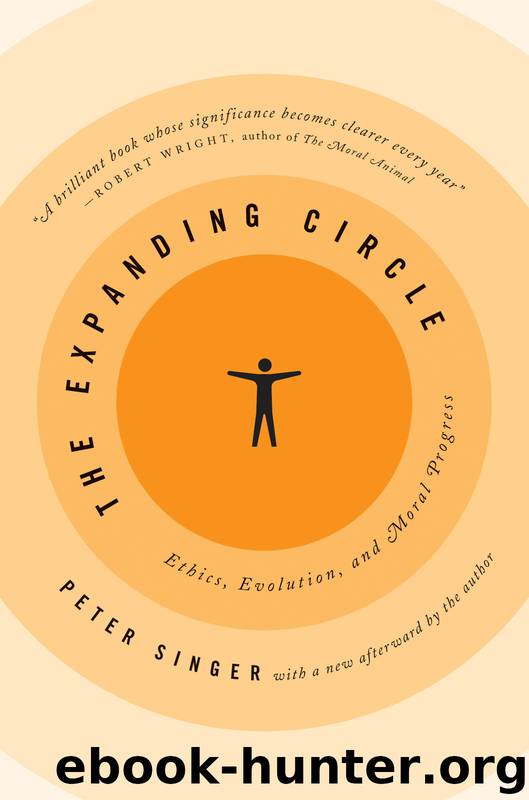The Expanding Circle by Peter Singer

Author:Peter Singer
Language: eng
Format: mobi, epub
Tags: non.fiction, philosophy
Publisher: Princeton University Press
Published: 1981-03-11T13:00:00+00:00
If there were objective values, then they would be entities of a very strange sort, utterly different from anything else in the universe. Correspondingly, if we were aware of them, it would have to be by some special faculty of moral perception or intuition, utterly different from our ordinary ways of knowing everything else.
The reason why objective values would have to be entities of a strange sort can be grasped from our previous discussion of the distinction between facts and values. Values are inherently practical; to value something is to regard oneself as having a reason for promoting it. How can there be something in the universe, existing entirely independently of us and of our aims, desires, and interests, which provides us with reasons for acting in certain ways? To borrow again from Mackie: How can “to-be-pursuedness” or “not-to-be-doneness” be built into the very nature of things?
We were discussing ethical egoism. In challenging the notion of moral principles which are true independently of their consequences, I have used heavy artillery to swat a fly. “Everyone ought to further his interests, whatever the consequences” was not a very plausible moral principle anyway. But the philosophical artillery would have had to be brought to bear, sooner or later, for there are more attractive moral principles which, like this form of egoism, satisfy the requirement of disinterestedness without adding up the preferences of all those affected. The conventional moral rules fall into this category. “Do not lie,” “Never take an innocent human life,” “Keep your promises,” “Do not commit adultery”—all imply the existence of ultimate moral standards independent of the interests of those affected.
Of course, some at least of these conventional moral rules could turn out to be sound principles of conduct—but not absolutely exceptionless rules—in the sense that they are the principles a society should adopt if it is seeking to maximize the interests of all, impartially considered. This would give them a dependent validity, like the dependent validity of egoism if, as the free market economists claim, we would all be better off if we were each devoted to the exclusive pursuit of our own interests. In Chapter 6 I shall return to this question of the principles a society should adopt in order to further the interests of all; at the moment my concern is to deny that the conventional moral rules are valid in their own right, irrespective of their good or bad effects. Only this stronger claim is a threat to the idea that impartial consideration of the interests of all is the rational basis of ethics.
My grounds for denying that it could be rational to accept the conventional moral rules as independently valid principles of ethics are identical to those on which I argued that we should reject the principle of egoism when this principle was presented as valid irrespective of its consequences for us all. If the moral rules are not to be recommended to the group on the grounds of their good consequences for the
Download
This site does not store any files on its server. We only index and link to content provided by other sites. Please contact the content providers to delete copyright contents if any and email us, we'll remove relevant links or contents immediately.
| Anthropology | Archaeology |
| Philosophy | Politics & Government |
| Social Sciences | Sociology |
| Women's Studies |
The remains of the day by Kazuo Ishiguro(8961)
Tools of Titans by Timothy Ferriss(8357)
Giovanni's Room by James Baldwin(7313)
The Black Swan by Nassim Nicholas Taleb(7097)
Inner Engineering: A Yogi's Guide to Joy by Sadhguru(6780)
The Way of Zen by Alan W. Watts(6589)
Asking the Right Questions: A Guide to Critical Thinking by M. Neil Browne & Stuart M. Keeley(5749)
The Power of Now: A Guide to Spiritual Enlightenment by Eckhart Tolle(5740)
The Six Wives Of Henry VIII (WOMEN IN HISTORY) by Fraser Antonia(5493)
Astrophysics for People in a Hurry by Neil DeGrasse Tyson(5172)
Housekeeping by Marilynne Robinson(4432)
12 Rules for Life by Jordan B. Peterson(4298)
Double Down (Diary of a Wimpy Kid Book 11) by Jeff Kinney(4257)
The Ethical Slut by Janet W. Hardy(4235)
Skin in the Game by Nassim Nicholas Taleb(4231)
Ikigai by Héctor García & Francesc Miralles(4228)
The Art of Happiness by The Dalai Lama(4118)
Skin in the Game: Hidden Asymmetries in Daily Life by Nassim Nicholas Taleb(3985)
Walking by Henry David Thoreau(3948)
